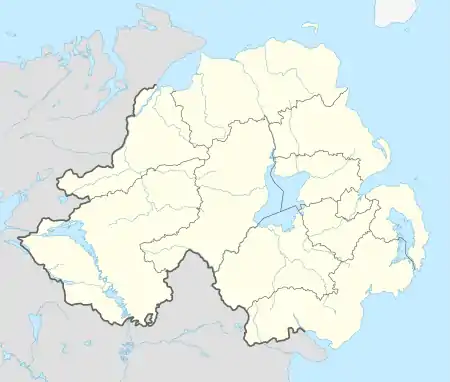Lisbellaw
Lisbellaw (from Irish: Lios Béal Átha, meaning "ringfort at the ford-mouth")[1] is a village in County Fermanagh, Northern Ireland, about 5 miles (8.0 km) east of Enniskillen. In 2008 it had an estimated population of 1,277 people.
Lisbellaw
| |
|---|---|
 Lisbellaw Parish Church | |
 Lisbellaw Location within Northern Ireland | |
| Population | 1,106 (2011 Census) |
| • Belfast | 78 miles |
| District | |
| County | |
| Country | Northern Ireland |
| Sovereign state | United Kingdom |
| Post town | ENNISKILLEN |
| Postcode district | BT94 |
| Dialling code | 028, +44 28 |
| UK Parliament | |
| NI Assembly | |
The village is built around the Church of Ireland parish church, which was built in the 18th century. The steep main street houses two grocery shop, a hairdressing salon, two pubs, a post office, a dentist's surgery, a beauty salon, a butcher, two mechanics, a pharmacy, a health store distributor, a chip shop, and a hardware store, as well as the Church of Ireland parish centre, the Methodist and Presbyterian churches. The Roman Catholic church building and a Plymouth Brethren gospel hall lie just off the main street. Just outside the village is Carrybridge, a marina on Upper Lough Erne.
Lisbellaw railway station opened on 16 August 1858 and shut down on 1 October 1957.[2]
Population
2001 Census
Lisbellaw is classified as a village by the Northern Ireland Statistics and Research Agency. A census performed on 29 April 2001 revealed a population of 1,046 people living in Lisbellaw. Of these:
- 24.0% were aged under 16 years and 16.7% were aged 60 and over
- 48.7% of the population were male and 51.3% were female
- 91.9% were from a Protestant and other Christian background (including Christian related community background) [3]
- 7.3% of the population were from a Catholic Community Background [4]
- 5.7% of people aged 16–74 were unemployed
2011 Census
On Census Day (27 March 2011) the usually resident population of Lisbellaw Settlement was 1,106 accounting for 0.06% of the NI total.[5]
- 99.64% were from the white (including Irish Traveller) ethnic group;
- 13.47% belong to or were brought up in the Catholic religion and 83.00% belong to or were brought up in a 'Protestant and Other Christian (including Christian related)' religion; and
- 72.42% indicated that they had a British national identity, 10.85% had an Irish national identity and 26.13% had a Northern Irish national identity. Respondents could indicate more than one national identity.
- 3.90% had some knowledge of Irish;
- 7.03% had some knowledge of Ulster-Scots; and
- 0.38% did not have English as their first language.
See also
References
- Placenames Database of Ireland
- "Lisbellaw station" (PDF). Railscot - Irish Railways. Retrieved 28 October 2007.
- "NINIS Area Profile of Lisbellaw".
- "NINIS Area Profile of Lisbellaw".
- "Census 2011 Population Statistics for Lisbellaw Settlement". NINIS. Retrieved 21 December 2019.
External links
| Wikimedia Commons has media related to Lisbellaw. |
